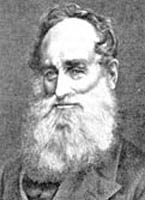Classic DACB Collection
All articles created or submitted in the first twenty years of the project, from 1995 to 2015.Moffat, Robert (D)

Robert Moffat was a pioneer missionary and linguist in southern Africa. He grew up in central Scotland, but in 1813 he moved to England, where he began to work for James Smith, a pious Scottish merchant in Manchester. Smith’s daughter Mary would later join Moffat in South Africa as his wife. The London Missionary Society (LMS) accepted him for missionary service and sent him to South Africa in 1817. There, working on the northern frontier, he gained fame as a result of the conversion of a notorious bandit, Jager Afrikaner, and his followers. In 1819 in Cape Town, Moffat married Mary Smith. Working together as full partners, they began their long stay among the Tswana. While Robert was away on his many long treks, Mary not only ran the home but also the mission. After some moves, they settled at Kuruman, which was to be their home until they left Africa. Here they created a large oasis of high fertility in a semiarid area. In 1829, Mzilikazi, chief of the Ndebele (a Zulu offshoot), contacted Moffat, who then visited the chief and began a most extraordinary friendship. Moffat visited Mzilikazi a second time in 1835 and then three more times after the Ndebele moved across the Zambesi. The last visit, in 1859, resulted in the establishment of an LMS mission near Bulawayo.
Almost from the beginning Moffat plunged into the work of translation. In 1840 he published the complete New Testament in Tswana. His translations set a style for Tswana, a language spoken across the breadth of southern Africa, from Namibia to the Free State. In 1857 the whole Bible in Tswana was published at Kuruman. On a visit to Britain he published his Missionary Labours (1840), which went through four editions in the next three years and made Moffat the best known missionary in Britain.
After 1860, Moffat took no more long treks but worked on consolidating the work at Kuruman. He preached there for the last time in March 1870; then he and Mary set sail for Britain, where Mary died in 1871. Moffat continued to work hard and did not give up addressing public meetings until 1878. His translation work was a great achievement and his role as a propagandist has rarely been surpassed. However, he never gained a deep understanding of African culture nor any closeness with individual Africans, even with those like Mzilikazi who were fond of him.
Andrew C. Ross
Bibliography
R. Moffat, Missionary Labours (1840. J. S. Moffat, The Lives of Robert and Mary Moffat (1885); C. Northcott, Robert Moffat: Pioneer in Africa (1961); J. P. R. Wallis, ed., The Matabele Journals of Robert Moffat (1945).
This article is reproduced, with permission, from Biographical Dictionary of Christian Missions, copyright © 1998, by Gerald H. Anderson, W. B. Eerdmans Publishing Company, Grand Rapids, Michigan. All rights reserved.



